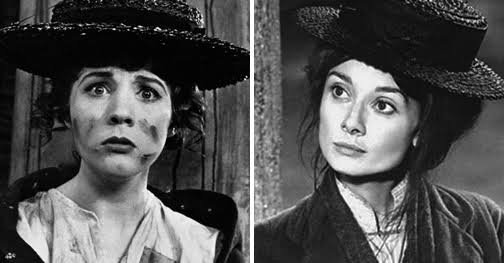
Was Julie Andrews a Much Better Singer Than Audrey Hepburn?
The comparison between Julie Andrews and Audrey Hepburn often emerges in discussions about classic Hollywood, especially within the context of their vocal talents. Both women left indelible marks on the entertainment industry, but their singing abilities have often been a point of debate. Julie Andrews, renowned for her exceptional vocal range and clarity, is widely regarded as a superior singer compared to Audrey Hepburn, whose acting prowess overshadowed her singing abilities.
#### Julie Andrews: The Quintessential Vocalist
Julie Andrews’ career as a singer began at a young age. Trained in musical theater, Andrews showcased her vocal talents on the West End and Broadway before transitioning to film. Her role in “The Sound of Music” (1965) solidified her status as a leading lady with an extraordinary voice. Andrews’ singing in the film, including iconic songs like “Do-Re-Mi” and “My Favorite Things,” demonstrated her perfect pitch, extensive vocal range, and ability to convey deep emotion through song.
Her performance in “Mary Poppins” (1964), for which she won the Academy Award for Best Actress, further highlighted her vocal strengths. Songs like “A Spoonful of Sugar” and “Supercalifragilisticexpialidocious” remain beloved classics, largely due to Andrews’ impeccable delivery. Her clear, bell-like voice, technical proficiency, and expressive nuances set her apart as one of the finest singers of her era.
#### Audrey Hepburn: An Actress First, a Singer Second
Audrey Hepburn, on the other hand, is celebrated primarily for her acting. Her ethereal beauty and captivating screen presence made her a star, but her singing abilities did not match her acting prowess. Hepburn’s most notable singing role was in “My Fair Lady” (1964), where she played Eliza Doolittle. Despite her charming performance, Hepburn’s singing was deemed insufficient for the demanding score composed by Frederick Loewe.
As a result, Marni Nixon, a professional singer, dubbed most of Hepburn’s songs in the film, including “I Could Have Danced All Night” and “Wouldn’t It Be Loverly.” Hepburn’s singing voice, while pleasant, lacked the power and technical skill required for such complex musical numbers. This decision was controversial and highlighted the stark difference in vocal capabilities between Hepburn and Andrews, who had originated the role of Eliza Doolittle on Broadway.
#### A Tale of Two Talents
The differing strengths of Andrews and Hepburn underscore the diverse skill sets that define their respective careers. Andrews’ vocal talent is unparalleled, her ability to perform demanding musical scores with ease earning her accolades and a lasting legacy in musical theater and film. Hepburn, conversely, excelled in roles that required a delicate balance of charm, elegance, and dramatic depth. Her singing was secondary to her acting, which became the cornerstone of her illustrious career.
While Andrews’ singing is universally acknowledged as superior, Hepburn’s contributions to cinema should not be overshadowed. Hepburn’s portrayal of characters in films like “Breakfast at Tiffany’s” (1961) and “Roman Holiday” (1953) showcased her acting talent and solidified her as an icon of classic Hollywood. Her ability to bring warmth and authenticity to her roles made her performances memorable, even if her singing did not reach the same heights as Andrews’.
#### The Legacy of Two Icons
Ultimately, comparing Julie Andrews and Audrey Hepburn as singers is akin to comparing apples and oranges. Andrews’ career as a singer and actress in musical films speaks to her exceptional vocal talent, while Hepburn’s legacy rests on her acting prowess and timeless appeal. Both women brought unique gifts to the screen, contributing to the rich tapestry of Hollywood history in their own distinct ways.
In the end, Julie Andrews’ singing abilities may be deemed superior, but Audrey Hepburn’s impact on cinema remains just as significant. Each left a lasting legacy that continues to inspire and entertain audiences, underscoring the diverse talents that define Hollywood’s golden age.
Leave a Reply